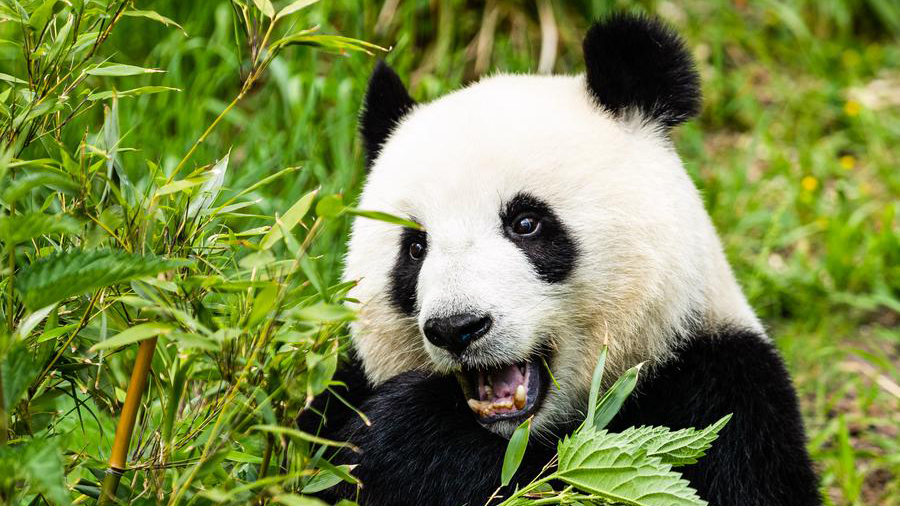Explore Chengdu, a city of happiness and vigor
Chengdu, capital of southwest China's Sichuan Province, is dubbed the "land of abundance." Nowadays, the city is brimming with boundless energy.
A famous historical and cultural city and also one of China's ancient capitals, Chengdu is the birthplace of the ancient Shu civilization.
Having a vast history, with 4,500 years of civilization and 2,300 years as an established city, Chengdu boasts distinct cultural features and an inclusive cultural environment.
Its unique charm is shaped by elements such as fiery hotpot, rapid technological development, and the world-famous giant pandas. The city strikes a balance between fast-paced living and a laid-back lifestyle, as well as a blend of tradition and modernity.
Fiery hotpot offers a glimpse into the hustle and bustle of Chengdu
When people talk about Chengdu, spicy hotpot immediately comes to mind. It has become an iconic symbol of the city.
The combination of ingredients like slices of beef, tripe, duck intestines, and vegetables, cooked together with chili peppers, creates a mouthwatering and addictive flavor that is both numbing and fresh. The hotpot culture has shaped the personality and character of Chengdu locals, and represents the diversity and inclusiveness of the city.

Chengdu hotpot. (People's Daily Online/Zhang Rong)
Chengdu has a rich history of embracing spiciness, with chili peppers becoming increasingly popular among the people in the southwestern region since the 19th century. The city's basin location, characterized by a humid and hot climate, provides an ideal environment for preserving chili peppers. Consuming them in moderation is believed to help dispel dampness.
The diverse range of ingredients used in hotpot reflects the fusion of cultures in Chengdu. Hotpot not only represents a delicious dish but also embodies the culture and spirit of the city. The deep love and passion for hotpot among Chengdu locals have turned the dish into a cultural symbol of the city.

Local residents play musical instruments in a park in Chengdu. (People's Daily Online/Wang Yuheng)
Technology injects momentum into new quality productive forces
Chengdu's inclusive and open cultural atmosphere provides a fertile ground for sci-tech innovation.
According to Xu Qin, head of the business division of Chengdu Ruileda Robot Technology Co., Ltd., the comfortable living environment in Chengdu creates a relaxed working atmosphere for technical professionals.
Chengdu is nurturing a rising force for sci-tech innovation.
It has established national innovation platforms such as the Chengdu Sci-Tech Innovation Ecological Island, the Chengdu Branch of the Chinese Academy of Sciences, and the National Supercomputing Center in Chengdu. These platforms cover basic research, technological innovation, and the transformation of achievements.

Photo shows a robot developed by Chengdu Ruileda Robot Technology Co., Ltd. (People's Daily Online/Zhang Rong)
Chengdu Ruileda Robot Technology Co., Ltd., located in the Chengdu Sci-Tech Innovation Ecological Island, is a key company in the Tianfu New Area of Chengdu.
According to Zhang Ruirui, chairman of the company, the Tianfu New Area has attracted numerous technology companies and professionals, becoming a destination for top-notch technology companies to settle.
Chengdu Ruileda Robot Technology Co., Ltd. focuses on researching human-machine interaction technology and developing humanoid robots.
"We've developed over 100 robot products in five series. Currently, we are developing humanoid robots with advanced capabilities in understanding, reasoning, and executing tasks," said Zhang.
The company designed and manufactured a robot named "Rong Bao" for the 31st FISU World University Games, which took place in Chengdu in 2023.
Chengdu provides favorable policies and a supportive environment for sci-tech research. This includes benefits such as talent settlement, covering the costs of education for children, and support for projects, according to Zhang.
"Chengdu is a place where individuals can enjoy a comfortable lifestyle while pursuing their career goals," he added.
International cooperation on giant pandas yields fruitful results
Giant pandas primarily inhabit the mountainous regions of Sichuan, Shaanxi, and Gansu provinces in China. The Chengdu Research Base of Giant Panda Breeding is situated in the Chenghua district of the city, covering an area of 3.07 square kilometers.

Photo shows a panda at the Chengdu Research Base of Giant Panda Breeding. (People's Daily Online/Zhang Rong)
At the Chengdu Research Base of Giant Panda Breeding, one can see tourists from all corners of the globe.
Vera, hailing from Russia, expressed that the Chengdu Research Base of Giant Panda Breeding is a very famous tourist attraction in Chengdu, and is a good place to see giant pandas and red pandas near their natural habitats.
"Excellent conditions are made for pandas. They are cuter than I imagined. It’s really good," Vera said.
Guo Yunxia, a young caretaker at the Chengdu Research Base of Giant Panda Breeding, joined the team after completing her university studies. Over time, Guo has developed a deep affection for the giant pandas, gaining a profound understanding of the habits of each panda under her care.
One of them, named "San You," is 7 years old. Guo described it as having a gentle nature, being a bit timid, and remaining highly vigilant while eating.

Photo shows a panda at the Chengdu Research Base of Giant Panda Breeding. (People's Daily Online/Zhang Rong)
According to Guo, the daily responsibilities of caring for the giant pandas are diverse, including providing ample food, monitoring their health, ensuring cleanliness and hygiene, tending to panda cubs, and eliminating any potential safety risks.
The Chengdu Research Base of Giant Panda Breeding has partnered with Japan, the United States, Spain, France, Germany, and Denmark to launch an international cooperative breeding program for giant pandas.
Through this program, they have successfully collaborated and conducted research in various areas such as giant panda breeding, animal behavior, and conservation education. As of 2023, a total of 37 cubs had been born through international cooperative breeding efforts.
Photos
Related Stories
Copyright © 2024 People's Daily Online. All Rights Reserved.









